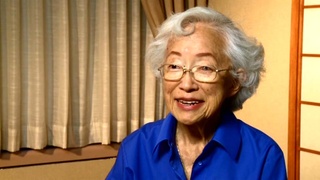Interviews
His testimony has more credibility because of his race
Being assigned to military intelligence gave me some credentials later on to say I was in military intelligence. There’s a certain mystique about that—actual or assumed—[which] nevertheless works in one’s favor.
And the other opportunity, besides meeting Aiko, was to meet other Nisei people with whom we’re still in contact. That helped because then I was able to flush out, to a great extent, the archival kind of material that we were running across. Then, I guess, being able to testify before [Congress], being able to prepare myself to testify with authority, required the knowledge and the skills—most of which were transferred to me from Aiko. With her assistance, I could go before the congressional committees and say with authority, with back-up material, with resources, what I was able to say.
Because I was not Japanese American, there was no doubt about my testimony. But if somebody else [a Nikkei] had said the same thing, if Seiichi Watanabe had [made a similar statement] under the same circumstances, with the same background as mine, it wouldn’t have carried the weight that I was able to present. [My testimony was acceptable] just because of my face [being a Caucasian].
Date: August 26, 1998
Location: Virginia, US
Interviewer: Darcie Iki, Mitchell Maki
Contributed by: Watase Media Arts Center, Japanese American National Museum
Explore More Videos


Appointing John Tateishi as National JACL Redress Chair
(1917 - 2004) Political activist

Inouye’s strategy for educating the American public
(1917 - 2004) Political activist

Recalling President Carter’s signing of the Commission bill
(1917 - 2004) Political activist

John Tateishi plays a role in changing people's minds
(1917 - 2004) Political activist


“No more shikataganai”
(1916-2010) draft resister, helped form the Heart Mountain Fair Play Committee



Traumatic experiences before camp
(1913-2013) Doctor specializing in obstetrics in Southern California

“Everybody went in like sheep”
(1913-2013) Doctor specializing in obstetrics in Southern California

Discrimination for Nisei doctors
(1928–2016) Daughter of an Issei doctor

The lawsuit set the standard for restoring people’s rights
(1927-2010) Political Activist

Beginnings of CWRIC
(b. 1931) U.S. Former Secretary of Transportation

